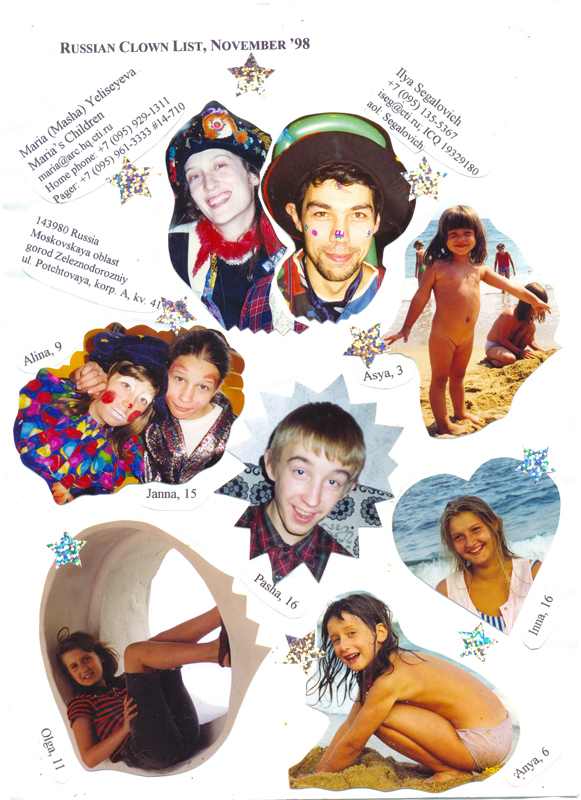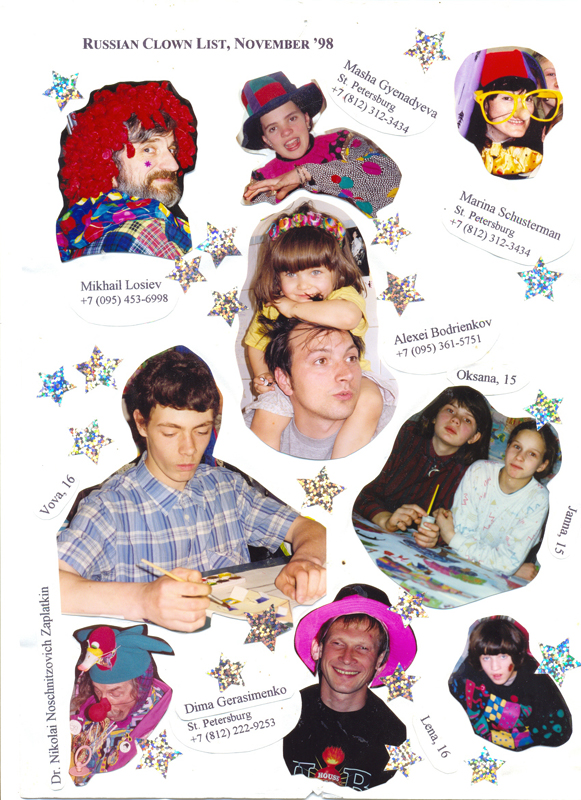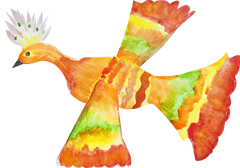Short story of “Maria’s Children”
by Maria Eliseeva, founder and director of the center
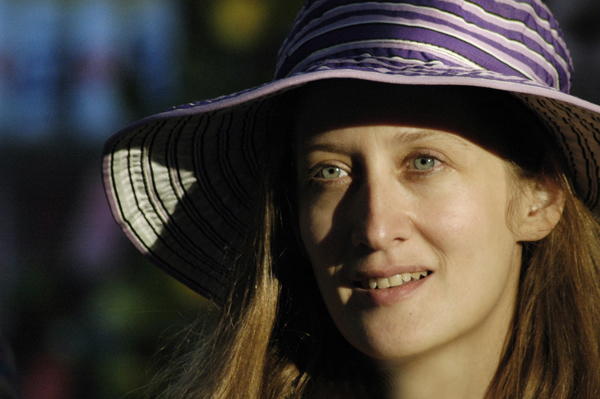
Maria Eliseeva
Maria meeting children for the first time
It was in September 1993 when I got a big pack of chocolates from my Italian friend Sivilia and a goal to give it to children who don’t get to eat sweets that much. I first tried to give it to an orphanage just by walking in, but they wouldn’t even let me enter. Then I called the local Department of Education and told them about the sweets from Italians and they said that in one there is a director who favors foreigners. They gave me her contact details and I called to make an appointment. The orphanage happened to be located very close and we set off, me and some Italians.
The door was locked, we rang a bell. The person who opened the door said: “Yes, we were informed. Give us the sweets. Thank you very much”. We asked: “Could we meet your children?” They were reluctant to let us in, but finally we made it inside. We saw a very dark empty corridor, but couldn’t hear children’s voices anywhere.
When we approached one of the classrooms the head teacher accompanying us reached for a key to open the door. We were shocked! Behind the door there was a teacher (also locked, but she probably had her own key) and some children. They were sitting behind their desks as during the lesson and watching some terrible soap opera.
It was heartbreaking: snotty, untidy orphans with hunger in their eyes singing about the Motherland.
We entered greeting them, but we could feel the tension in the air. The teacher couldn’t even understand why we were there. It was unusual for strangers to visit the orphanage.
We asked them: “What else are you doing apart from watching the TV?” The teacher said: “We also can sing and dance. Let’s line up!” First Janna and Pasha dance polka and later she lined them up to sing a song about the Motherland. It was heartbreaking: snotty, untidy orphans with hunger in their eyes singing about the Motherland.
Worth mentioning that we managed to give away only some of the sweets to the children, the rest was taken from us. And then the head teacher said: “Well, and this is the end of your visit”. “Could we see the rest of the orphanage? Where do your children sleep or eat?” we asked. “No, we can’t show you the dorms, all of them are locked now. I guess we can show you the canteen, but please take into consideration that our children are ill, so all the lamps are broken. Don’t be surprised,” she replied. And she showed us the canteen complaining that children have broken all the furniture and there is nobody to fix it and that it would have been great to find some sponsors for the renovation. After that she left and we had a chance to spend some time with the children in an informal setting. My Italian friends had a real photo camera. Pasha took it, figured out how to operate it and started taking pictures of everything he saw. I had a real little baby with me – my 10-month old daughter Anya – a very happy baby with blue eyes and ginger curls. She made a splash. Children were studying her attentively still afraid to touch little fingers and tiny shoes. They swamped me with questions: “Is it a doll? Is her hair real? Why can’t she talk? Can she cry?” and took turns carrying her around. At that moment I realized that the last time they probably had seen a baby was at the orphanage when they had been the babies themselves. I decided that I could come here sometimes with Anya and my two elder children just to play with the children.
Continuation. Still orphanage
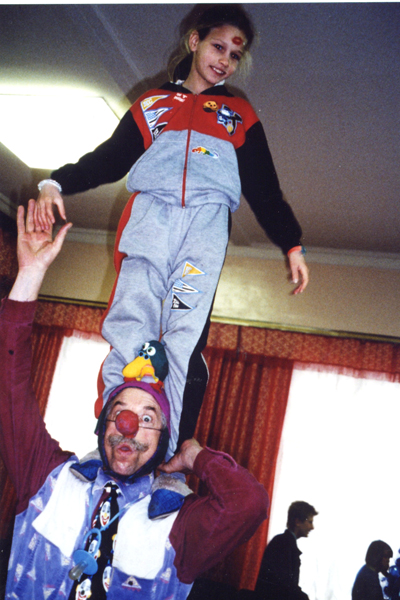
Very soon I contacted the orphanage. My friend Patch Adams and his team were planning another trip to Russia. Usually the clowns would come to Moscow for a week to visit children’s hospitals.
The previous year I was helping them with scheduling the appointments and I thought that this time I could bring them to the orphanage.
Patch didn’t understand a word of Russian, but kept nodding and saying: “I love you!”
The director of the orphanage agreed that clowns were a good idea and was ready to arrange their visit. However she also asked if they could at the same time buy some plumbing fixtures for the orphanage. I let it slip and replied that everything was possible. Later she tried to raise this topic with them.While clowns were running around the orphanage entertaining the children, she caught up with Patch and started explaining that they needed some plumbing items and also a video camera. Patch didn’t understand a word of Russian, but kept nodding and saying: “I love you!”
During that second visit the children recognized me despite of a wig, a makeup and a costume. Sasha, Pasha and Janna remembered me and distinguished me from a crowd of clowns. It was a nice feeling. I promised that I would come again but it turned to be more difficult as I was alone then, not supported by any foreigners. I had to explain my reasons to visit to the director and the head teacher. I told them that I was an artist and could teach children to draw. They were very surprised but let me in.
I started visiting the orphanage regularly. The first time I brought a big panel painting from a children’s studio I was working at that time. “Let’s also make a painting all together,” I suggested. “The same one?” they asked. “Not the same, just a very big one and all together”— “Ok, let’s make one, but only if we could make it exactly the same”. I didn’t understand then why they were insisting on copying. In the end we created the new version of the same painting “Fairytale Island”. There were some new details and new characters, the colors were different, of course, but the composition remained.
The children were very surprised that I brought paint as they were not allowed to use it before. They were given two felt-tip pens per child and the colors could be for instance black and brown.
The administration didn’t like my idea to use paint as they saw it as a source of mess. Spilled jar of water was a disaster despite all the floors were covered with linoleum.
I remember once Lena Il’ina, a very active and impulsive girl, by accident knocked off that very jar of water. Il’ya rushed for a cloth to wipe it, but a teacher took the cloth away shouting: “No, She, so-and-so, let her clean it herself. Fuff! She must do it herself!” Il’ya quite assertively took the cloth back and said that he would do it as he didn’t mind. The teacher was very surprised.
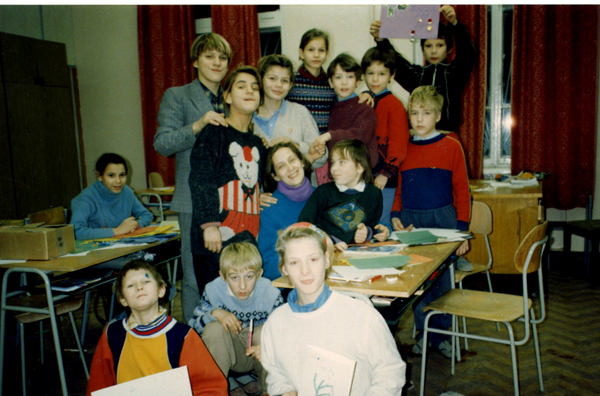
Theater studio “The Basement”
During the next five months in the orphanage we made another big painting “The Toy Land”.
Meanwhile Yulia Sheveleva and Amir Tagiev from the theater studio “The Basement” asked me to work with their special needs children. We agreed that I would be coming to their studio with a group the orphanage children. However it turned to be more difficult to arrange it with the orphanage administration than I had thought.
Teachers started using our trips to the studio as a reward and punishment. They could deny an opportunity to go for a single child or a whole group. From the orphanage we would go to the studio by tram to the Semenovskaya metro station and from there by metro with several transfers. It was difficult. In one of the first trips Pasha almost jumped on the road and I literally seized him by the scruff of his neck from under a car. Another time Lena on purpose got off a train at a wrong station and got lost in the metro. As soon as it became apparent that I could not manage on my own, Il’ya and my other friends showed up and started helping me bringing the children to the studio.
I started actively searching for some transportation. Olga Alexeeva gave me a list of organizations that, according to her, could have it. I called all of them and one of them agreed to help. It was the Moscow Charity House which is now called The Center for Volunteers. Galina Bodrenkova assigned us a car with a driver to bring us to the studio. For some time we were going once a week. It was the whole new life for us before an incident with a purse.
We were celebrating Il’ya’s birthday. Everybody was having fun when Yulia announced: “Guys, my purse with my whole salary has just disappeared” and nobody was around who could have done it but our children. It was the first time and we were lost but our driver Lesha suggested: “No, this won’t work! Let’s stop the celebration and find the purse. Let’s do the following: one by one we enter a dark room, exit and a person who took the purse will just leave it there. We switch on the light and the purse is there. Does everyone agree? Agreed!” This is exactly what happened, the purse with the full amount was found. After this incident Lesha imbued with children and the whole situation in general, he realized that he could change something in their lives. In a week time he told me: “I arranged everything. I remember you wanted to go to the studio more often. Let’s do it three times a week.” I was surprised then how had he managed. Later I was invited to the conference “Affordable Transport” to talk about the support the “Moscow Charity House” gave us. At the conference a nice unfamiliar woman approached me and started thanking me for her son who had changed so much, became kinder and more serious, since he started going to the studio. I was listening and thinking that it was a mother of one of the children I worked with in “The Basement”. However when the conference started the same woman came on stage to open it and presented herself as Galina Bodrenkova, the president of the “Moscow Charity House.” Only then I realized that our driver Lesha was her son.

Yulia Sheveleva and Amir Tagiev from the theater studio “The Basement” asked me to work with their children.
Il’ya was buying us paint, brushes and something tasty for tea: cakes, cheese and even sausage when we were having a feast. We were only buying “white” bread (Russian heavy wheat bread) as in the orphanage it was limited and, therefore, was a delicacy. We were only drawing first, and then started working with clay when Lena Tatarintseva, the ceramist, joined our team. We were not engaged in the theater as Yulia viewed all our children and concluded that they were all very reserved and not artistic, it was a bit early for them.
Mikhail Losev: “Money will come with time and is not the most important thing in life. I have been searching for a similar project for a while and I like what you are doing”.
Once of a sudden I got my first employee. Mikhail Losev, a nice bearded man, came to me holding a post card with our painting replica in his hands. “I would like to work for you,” he said. “Sure!” I replied, “but how will I pay you? I don’t have any money.” - “Money will come with time and is not the most important thing in life. I have been searching for a similar project for a while and I like what you are doing”. Misha started bringing children from the orphanage to the studio, tinkering with the boys, finding people to help us. We got to know his wife Yulia and two daughters. Very soon we realized that we needed to register our organization.
Why did we leave “The Basement”? At some point we realized that we had become a burden to our friends. Despite the story with a purse had a happy end, it wasn’t the only incident. The number of children was growing. When Sasha Korostelin was transferred to the orphanage #18 we took a big group from that orphanage. Later the orphanage #20 joined, children with Cerebral Palsy. Three orphanages meant around 60 children not counting friends and acquaintances, our friends’ children and friends of our children. I figured we had to find our own home.
Flat on Paveletskaya
After roaming around several places we seemed to have a way out of the situation. The incident with the children club at Prechistenka was the last straw. We refurbished the place and started bringing our children there but didn’t get our own key. On one of our studio days we were standing there in front of the locked doors. Misha Losev brought the children from the orphanage and we were sitting outside, packed into my “Zhiguli” because it was raining and the owner of the place had left to her country house without informing us. At that moment Il’ya called and I told him about poor and homeless us. He said: “That’s it! I can’t see you suffering. We need to do something.”
After the studio on Paveletskaya we didn’t want to depend on anybody or to be anybody’s guests, we realized that we wanted our own home.
Il’ya decided to rent us a flat! It was a period after the default when rent rates were quite low. Yulia Loseva found us a great place. It was a three-room flat on the ground floor of the apartment building not far from the Paveletskaya metro station. I think that was a turning point because we got a Real Home. After the studio on Paveletskaya we didn’t want to depend on anybody or to be anybody’s guests, we realized that we wanted our own home.
Very soon children with no place to live appeared. Nadya was signed out of the orphanage to join her father, but the person who was officially her father wasn’t ready for it. Sveta also left the orphanage that year, but couldn’t live with her mentally ill mother. Then homeless Roma and Rusik, the graduates of an orphanage in the Moscow region, turned up. They had a room in the communal flat four hours from Moscow, but wanted to study and work in Moscow. And all of them came to live in that flat on Paveletskaya. We found several American volunteers - Julian and Julia, Lara and Melva - who agreed to stay with the children and help in the studio. It was an unusual commune. I remember how I cooked soup with the children as most of them couldn’t even boil pasta. Later a new boy from the “Ark” and a real cook with a diploma Ilyusha Kubantsev joined.
One day we decorated the porch of the building with beautiful flowers, rainbows and birds. But other tenants didn’t approve of our initiative and made us paint everything over in grey. It was our first mural experience!
Alexandr Gorlov, a retired lieutenant colonel, was working in the studio at that time. Together with him and Misha Losev we went to the local administration, wrote letters asking for a space for our studio and finally we got it – a small semi-basement on Dmitrovsky lane.
From the old interviews. Studio on Paveletskaya, 2000
Sveta Khokhlova: —American clowns came to our orphanage. We got to know them and became friends. And Masha started visiting us more often.
Nadya Varaksina: — We were in the third grade, Masha and Ilyusha (they were not married then) were visiting us with their friends. We were drawing.
Later they started taking us home for weekends. We prepared small papers to draw the numbers. A number indicated a turn to go to Masha or Il’ya. The first time I went to Il’ya. He taught me how to play chess.
Sveta: — I was at Masha’s place. Got to know her children. They had a lot of toys at their place.
Sasha Diomin: — We celebrated our birthdays at Masha’s place for the first time. We even had a cake. We were also given toys as gifts. In the orphanage we have never celebrated our birthdays.
Nadya: — One day Pasha, Sasha and I went to visit Ilyusha. We dressed as clowns and tried to catch a taxi. Ilyusha made us laugh. He is a very funny clown.
Oksana Novikova: — Zhanna and I were visiting on weekends more often than others. We were helping Masha to look after her children.
Nadya: — In the beginning we were drawing in our class in the orphanage and later started going to “The Basement” studio. We went by metro and later they ordered us a bus.
Sasha: — We made our first painting “The Island of Happiness”. We left it in our class for decoration.
Nadya: — Teachers were scaring us all the time: “You won’t go to the studio.” I didn’t like it.
Sveta: — We even attended Masha’s and Ilyusha’s wedding in the registry office. We put the fireworks in the snow. When Masha and Ilyusha were coming out, the boys fired them. People were surprised to see so many children at the wedding. Later we celebrated it in the studio. Masha’s parents and friends were there as well. It was a cool wedding! I saw the wedding for the first time in my life. Masha was very beautiful and she got a lot of presents!
Nadya: — I was the first to know that Masha would have a baby. She was still coming to give us classes.
Sveta: — In the beginning Masha wanted to have a baby boy. She didn’t know in the beginning if it would be a boy or a girl. Then she found out that it was a girl. When Asya was born and we saw her for the first time Lena asked: “Masha, is it a toy?” Asya was a very cute baby.
Oksana: — And when she grew up she became very naughty. Didn’t let anybody to put a nappy on, was biting.
Inna Agaltsova: — I have known Masha for three years. When the clowns came I met Marina from Saint-Petersburg and showed her my drawings, then I got to know Masha and started coming to the studio. I remember that everybody was drawing at the tennis table. I liked Masha’s children and Anya most of all.
Sasha: — When clowns come we go with them to visit the hospitals. We go to ones with cancer patients.
Sveta: — There is a children’s ward and also one for older people. Babies sometimes are scared of clowns and start crying. But mainly they are laughing. Doctors are asking us afterwards: “Will you come again?” Everyone was looking at us in the metro, laughed and asked where we were from. We also went to Red Square with the clowns. There we made children laugh as well.
Oksana: — In the beginning I was shy to make people laugh, but now I know how to do it.
Sveta: — We didn’t want Masha to take children from other orphanages, but Masha said that we have to. And when children from the orphanage #18 joined, we became friends.
Nadya: — Our life changed, changed so much. We became different people.
And this is how we looked in 1998 preparing to meet the clowns:
